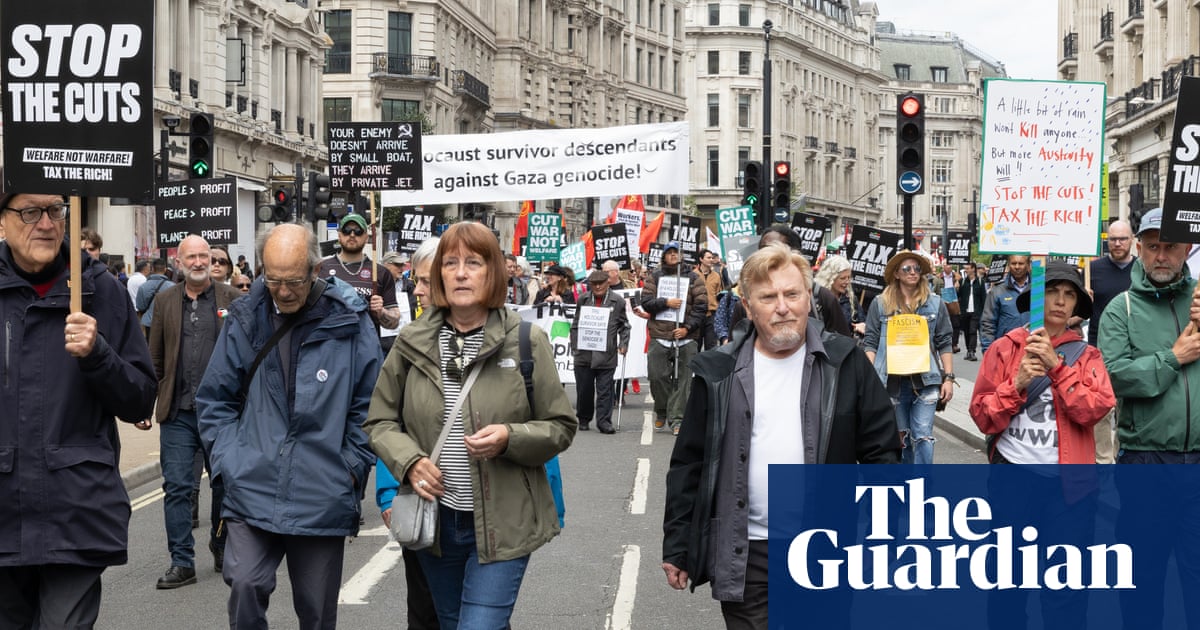Thousands of people marched through central London on Saturday calling for an end to public service and welfare cuts, in the first big anti-austerity march under Keir Starmer’s Labour government.
Thecampaign group People’s Assembly, which organised the demonstration, called on the government to “tax the rich and their hidden wealth to fund public services”.
The People’s Assembly said it was bringing together trade unionists, health, disability, housing and welfare campaigners with community organisations under the slogan: No MoreAusterity2.0.
Speaking at the rally, the backbenchLabourMP Diane Abbott criticised Starmer’s comments on immigration as “fundamentally racist”, suggesting the government was copying the rhetoric of Reform UK.
The Hackney North and Stoke Newington MP said there was an international struggle to “fight the rich and the powerful [and] to fight the racists”, including in her own party.
“I was very disturbed to hear Keir Starmer on the subject of immigration. He talked about closing the book on a squalid chapter for our politics – immigrants represent a squalid chapter. He talked about how he thought immigration has done incalculable damage to this green and pleasant land, which, of course, is nonsense – immigrants built this land. And, finally, he said we risk becoming an island of strangers.
“I thought that was a fundamentally racist thing to say. It is contrary to Britain’s history. My parents came to this country in the 50s. They were not strangers. They helped to build this country. I think Keir Starmer is quite wrong to say that the way that you beat Reform is to copy Reform.”
Writer Kate Hardie, 57, was among those marching to Whitehall. She had voted for Labour in every election since she was 18, including last year, but said she will no longer support the party under Starmer.
“I worry about the fact that this government is making cuts that are unnecessary. People are really suffering because of it,” she said.
She has friends who are disabled, who were “devastated” when cuts to personal independence payments (Pip) were announced. “It isn’t just about my friends, because if we only vote for the people that we know, we’re in trouble,” she added.
Hardie was also dismayed over the prime minister’s widely criticised “island of strangers” speech, which was likened to the rhetoric of Enoch Powell.
“There’s the problem of cuts and a problem with rising hate in this country and around the world,” she said. “It’s not just financial, it’s also ideological and about how we treat each other.”
She thinks the government’s current approach will bear little fruit electorally. “Why would you go and see a tribute band if you can get the real thing? It’s not gonna work, it’s ridiculous.”
Daniel Kebede, the general secretary of the National Education Union, said: “People are very disappointed in this government. Whether it has been cuts to winter fuel, the two-child benefit cap still being in place, we haven’t seen enough investment.
“We appreciate that the government have a tight fiscal window to operate in, but we think they need to tax the wealthy more and start investing in communities.”
He said the “commitment to roll out free school meals to all families in receipt of universal credit” was welcome but called on the government to “go much further much faster because the only person who is benefiting from cuts to communities is Nigel Farage”.
Holding a sign calling for landlords to be taxed – including herself, Corinne Richeux, 57, who runs an NGO based in China, said: “I’m really worried about the state of the country and I don’t think British people can take austerity any more. We need a real radical change of direction and we need to tax the rich to make it happen.
“I think that many rich people would support more taxation. I think it’s cowardly of the Labour government to pander to the rich when the people are really struggling.”
She said she “was shocked when the first thing they did was to start slashing benefits”.
“I kind of hoped that he was keeping his cards close his chest and that he was planning on taxing the rich when he got into office. I wasn’t expecting it to be quite so bad.”
Labour-run councils were also a target of criticism. Helen Davies, 59, a social worker, chanted in support of bin workers in Birmingham, who have been striking since January.
On central government, she said: “It’s not what we expect from a Labour government. The social inequalities are being driven harder, there has to be a positive alternative to that.”
PA Media contributed to this report
